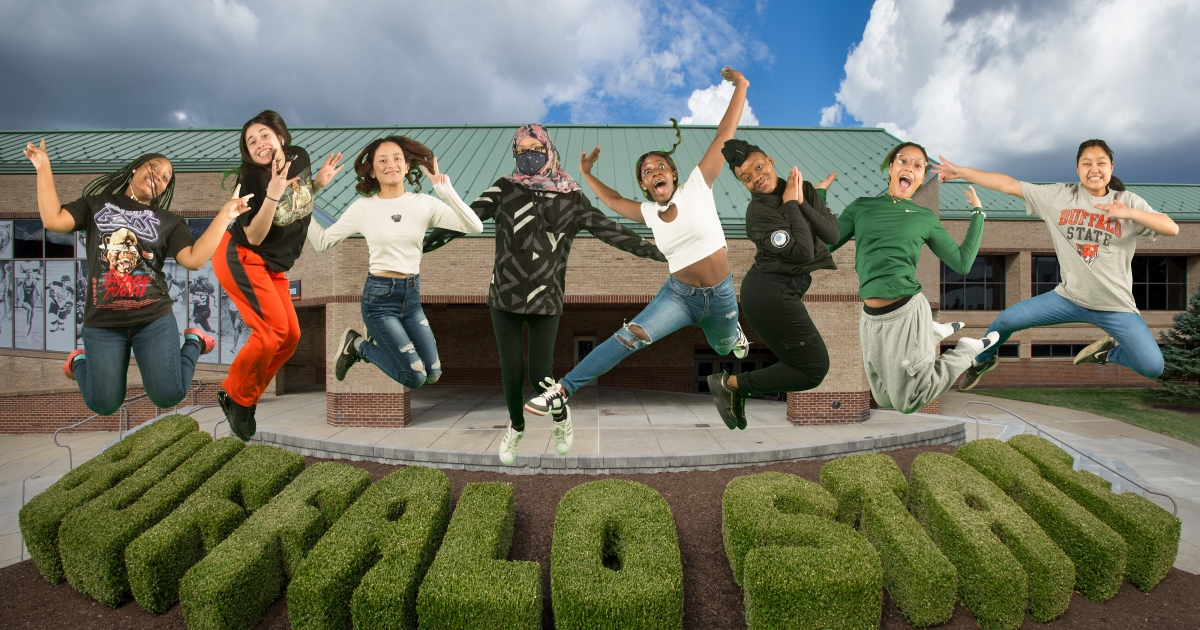
Growing up, Kylene Holmes wanted to be a teacher.
“I never actually acted on it,” she said, instead opting for a business degree from Buffalo State College in 2018, after spending several years away from school to take care of her son.
Fate, however, had different ideas, and Holmes found herself working as a teaching assistant in the Buffalo Public Schools. That’s where she found out about a teacher diversity pipeline program designed to provide teacher aides and assistants with a path to become teachers through Buffalo State.
Holmes completed her master’s degree in childhood education this past spring, and she was offered a teaching position with the Buffalo schools in the fall.
“I loved everything about the program,” she said.
Holmes is just one success story to come from the Buffalo Urban Teacher Pipeline Residency Program. Launched in 2019 and supported by legislative funds secured by Assemblywoman Crystal Peoples-Stokes, ’74, ’02, it’s one of two educator pipeline programs currently sponsored by Buffalo State College whose purpose is to diversify the teacher workforce, especially in the city of Buffalo and its first-ring suburbs, said Wendy Paterson, dean of the School of Education.
“Students need to see teachers from all backgrounds and ethnic origins and multilingual homes, teachers who look like them, come from backgrounds harmonious with theirs, and whom they may emulate and admire.”
“Students need to see teachers from all backgrounds and ethnic origins and multilingual homes, teachers who look like them, come from backgrounds harmonious with theirs, and whom they may emulate and admire,” she said.
The other pipeline program designed to increase teacher diversity, the Urban Teacher Academy, was initiated in 2017 in connection with the BPS Career and Technical Education Department. This program provides entering high school students with a choice of career trajectories. Those who consider teaching as a career are placed at McKinley High School in Buffalo, where their high school years will also prepare them for the skills and challenges of teaching. In their senior year, successful candidates in the UTA have the opportunity to take college-level courses and work toward being accepted at Buffalo State in education majors. The idea is to “grow your own” teachers at the beginning of their high school studies and to support them to graduation and matriculation to college, said Kathy Wood, associate dean of the School of Education.
“We now have a first inaugural class of seniors who will graduate from McKinley High School, of which six students have chosen to come to Buffalo State,” she said, noting that four of the students plan to enroll in the teacher education program. “The exciting part is that the Buffalo Public Schools and many urban schools need more diverse teachers in their workforce. And our ‘grow your own’ model is doing just that.”
The Urban Teacher Academy gives Buffalo State faculty four years to help the high school students in the program get involved with teaching opportunities and community service. This helps get them excited and motivated about coming to college for teaching, Wood said.
“In their senior year in the program, they actually come to campus, and they take the courses right on our campus with our faculty,” she said. “That has had a huge impact on the program because they really get the college experience. They’re sitting side by side with college students in their classes. It’s a more authentic experience and helps them better understand the expectations of what they should know and do while they’re in college.”
The Urban Teacher Academy is important because it’s a way to recruit people of color into teaching, Paterson said. Students of color may not always have had positive school experiences, so becoming a teacher may not be a career of choice for them.
“Some of those students would just say, ‘I don’t want to be a teacher,’” she said. “And you know that they live in settings that are not always easy. So school is not necessarily a really great place to be in. They don’t want to choose to be in that environment for their life’s career.”
“It’s an interesting concept,” Paterson said. “It’s grabbing that eighth-grader when they’re not really ready to become locked onto a career path.” Reaching students at a younger age, before they get into high school, gives them a chance to learn and think more about being a teacher, as opposed to introducing the idea once they’re already in high school, and already planning on a different career, she said.
Likewise, the Teacher Diversity Pipeline program gives teacher aides and assistants the opportunity to move to the next step in actually becoming teachers, Wood said.
“Many if not most of them are from the same community these children are from,” she said. “They come with such a wealth of experience, and are great role models for the students. They just need that support to go on to get their teaching certification and to complete their undergraduate or graduate degrees.”
Preparing teachers involves science, craftsmanship, and art, Paterson said. The aides and assistants bring strong craftsmanship and their own art to the position, while Buffalo State aims to provide the science behind teaching.
“They have good instincts. They’re boots on the ground,” she said. “They’re citizens of the school, and they are already in it. That’s a great advantage for them.”
Candidates in the pipeline program are succeeding at a high rate, Paterson said, just as Holmes has.
“I feel great about it,” Holmes said, referring to her teaching position. “I'm definitely ready for a change. And to actually be the teacher? I can’t wait.”
Photo illustration by Bruce Fox, campus photographer.



